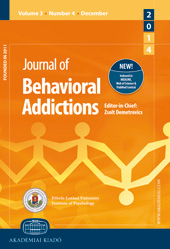Sleepiness and cognition in young adults who gamble and use alcohol
Sleepiness and cognition in young adults who gamble and use alcohol
Author(s): Arit M. Harvanko, Katherine L. Derbyshire, Liana R. N. Schreiber, Jon E. GrantSubject(s): Psychology, Cognitive Psychology, Behaviorism, Substance abuse and addiction, Health and medicine and law
Published by: Akadémiai Kiadó
Keywords: sleep; gambling disorder; cognition; decision-making; alcohol;
Summary/Abstract: Past research suggests that sleep problems are associated with increased risky decision-making. Similarly, gambling disorder and alcohol use disorder are also associated with increased risky decision-making. Individuals with gambling disorder or alcohol use disorder have also reported higher rates of sleep problems compared to normal healthy controls. As such, we sought to examine whether sleep problems play a role in the development of alcohol use disorder or gambling disorder. Methods: One hundred and forty-one individuals who gamble and use alcohol, yet do not meet criteria for gambling disorder or alcohol use disorder, were assessed to determine the correlation between sleepiness, amount of sleep obtained, decision-making, and alcohol or gambling behaviors. Results: Our results suggest that inconsistent sleep patterns may be associated with increased frequency of alcohol use and gambling. We did not, however, find a significant correlation between sleep factors and decision-making. Discussion: Further research is needed to examine the specific relationship between sleep patterns and alcohol use and gambling frequency. Overall these data suggest that sleepiness or sleep and risky decision-making is not a significant factor in gambling and alcohol use behaviors in individuals not meeting criteria for alcohol use disorder or gambling disorder.
Journal: Journal of Behavioral Addictions
- Issue Year: 3/2014
- Issue No: 3
- Page Range: 166-172
- Page Count: 7
- Language: English

